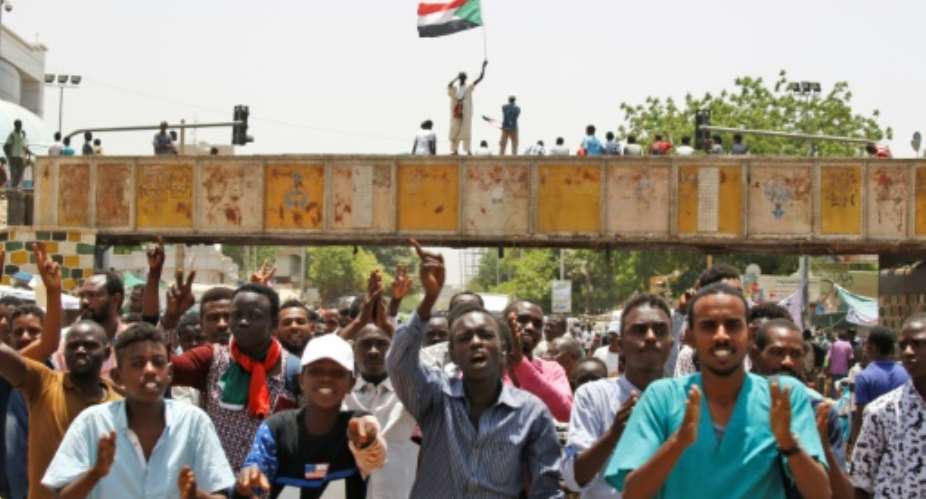Protest leaders on Wednesday accused Sudan's military rulers of delaying the transfer of power to a civilian administration, amid disagreements over the country's new governance structure after president Omar al-Bahir's ouster.
The two sides are grappling over whether an overall ruling council should have a civilian or military majority.
Last week the Alliance for Freedom and Change protest group handed over its proposals for a civilian structure, including executive and legislative bodies, that it eventually wants to rule the country after replacing the generals.
The 10-member military council late on Tuesday said it agreed to the overall proposals, but had "many reservations".
The protest leaders said on Wednesday that the military council was delaying the entire transfer of power.
"The military council's response... is moving in the direction of extending the negotiations and not in the direction of a transition" of power, the alliance said in a statement.
The protest movement said the military council was looking to "prolong the negotiations" after the generals took over following the toppling of Bashir on April 11.
 The spokesman of Sudan's Transitional Military Council, Lieutenant General Shamseddine Kabbashi, speaks during a press conference in Khartoum on May 7, 2019. By MOHAMED EL-SHAHED (AFP)
The spokesman of Sudan's Transitional Military Council, Lieutenant General Shamseddine Kabbashi, speaks during a press conference in Khartoum on May 7, 2019. By MOHAMED EL-SHAHED (AFP)
The military council said the alliance had remained silent on ensuring that Islamic sharia remains the bedrock of Sudanese legislation.
The protest leaders say the generals had "raised irrelevant issues including the language and sources of legislation in a tedious repetition of the biddings of the former regime".
"We call on the military council to reach an agreement to transfer power," they said.
The Alliance for Freedom and Change is made up of several political groups, leaders and activists, many of them of the view of building a new secular Sudan.
'Kidnap the revolution'
Sudanese media and websites have often reported that for the protest leaders the issue of legislation and Islamic law is something that can be discussed later, but they first want a civilian body established in order to govern the country.
 Thousands of protesters have been camped outside the Sudanese headquarters of the armed forces in Khartoum since April 6, demanding the military hand over power to civilian rule. By Ebrahim Hamid (AFP)
Thousands of protesters have been camped outside the Sudanese headquarters of the armed forces in Khartoum since April 6, demanding the military hand over power to civilian rule. By Ebrahim Hamid (AFP)
The protest movement said the miliary council is acting in a way that seems to "kidnap the revolution and control its outcome".
"The only choice for our people is comprehensive peaceful resistance until the revolution's demands are achieved."
Thousands of protesters remain encamped outside the sprawling military headquarters in central Khartoum since April 6.
Initially they gathered there to seek the army's support in ousting Bashir.
But now they continue to hold their sit-in against the army council, demanding that it step down and transfer power to a civilian authority.
The military council and protest leaders have differed on several issues and not just the composition of an overall ruling council.
The military council wanted a two year transition period as opposed to four years proposed by protest leaders.
The military council was also of the opinion that declarations of emergencies be in the hands of a "sovereign" authority and not the cabinet as proposed by protest leaders.
Protest leaders have often called the military rulers the "remnants of the regime" of Bashir.
 Sudanese protesters, walking on the railways, wave the national flag during a sit-in outside the army headquarters in the capital Khartoum on April 28, 2019. By OZAN KOSE (AFP)
Sudanese protesters, walking on the railways, wave the national flag during a sit-in outside the army headquarters in the capital Khartoum on April 28, 2019. By OZAN KOSE (AFP)
The council also revealed on Tuesday that Sudan's former head of the feared National Intelligence and Security Service, Salah Ghosh, had been put under house arrest.
It was Ghosh who oversaw security agents' sweeping crackdown on protesters before the fall of Bashir.
Protest leaders however insist that their key demand remains the same, a full transfer of power to civilians.
"The solution and success of the revolution lies on transfer of power to a full civilian authority," protest leader Mohamed Naji al-Assam said on Tuesday.





 'Kill whoever will rig Ejisu by-election' – Independent Candidate supporters inv...
'Kill whoever will rig Ejisu by-election' – Independent Candidate supporters inv...
 Ashanti Region: ‘Apologize to me for claiming I owe electricity bills else... – ...
Ashanti Region: ‘Apologize to me for claiming I owe electricity bills else... – ...
 Ghana is a mess; citizens will stand for their party even if they’re dying — Kof...
Ghana is a mess; citizens will stand for their party even if they’re dying — Kof...
 Internet shutdown an abuse of human rights — CSOs to gov't
Internet shutdown an abuse of human rights — CSOs to gov't
 Free SHS policy: Eating Tom Brown in the morning, afternoon, evening will be a t...
Free SHS policy: Eating Tom Brown in the morning, afternoon, evening will be a t...
 Dumsor: A British energy expert 'lied' Ghanaians, causing us to abandon energy p...
Dumsor: A British energy expert 'lied' Ghanaians, causing us to abandon energy p...
 What a speech! — Imani Africa boss reacts to Prof. Opoku Agyemang’s presentation
What a speech! — Imani Africa boss reacts to Prof. Opoku Agyemang’s presentation
 Dumsor: Tell us the truth — Atik Mohammed to ECG
Dumsor: Tell us the truth — Atik Mohammed to ECG
 Dumsor: Don't rush to demand timetable; the problem may be temporary — Atik Moha...
Dumsor: Don't rush to demand timetable; the problem may be temporary — Atik Moha...
 Space X Starlink’s satellite broadband approved in Ghana — NCA
Space X Starlink’s satellite broadband approved in Ghana — NCA
